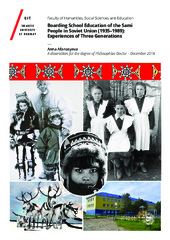Boarding School Education of the Sami People in Soviet Union (1935–1989): Experiences of Three Generations.
Permanent link
https://hdl.handle.net/10037/15101Date
2019-05-03Type
Doctoral thesisDoktorgradsavhandling
Author
Afanasyeva, AnnaAbstract
This monograph examines boarding school policies introduced on the Sami people in the Soviet Union from 1935 to 1989. On the basis of field and archival research on the Kola Peninsula and in Moscow, conducted over the course of 2014 and 2015, the study offers historical accounts and experiences of residential schooling among three generations of the Sami people in Russia. Through Sami oral accounts, archival documents, as well as Soviet, Russian and Western sources, the dissertation explores a series of rapid policy changeovers in the boarding school education of the Sami. By focusing on two surpassing but contradictory tendencies in boarding school education of the Sami, the study cultivates notion of residential schooling as a tool for coeval empowerment and assimilation of indigenous peoples and their languages. The study finds that long-term separation of children and parents in result of residential education caused severe disintegration of an indigenous family as social arena for cultural and language transference across three studied generations.
Publisher
UiT Norges arktiske universitetUiT The Arctic University of Norway
Metadata
Show full item recordCollections
Copyright 2019 The Author(s)
The following license file are associated with this item:


 English
English norsk
norsk
